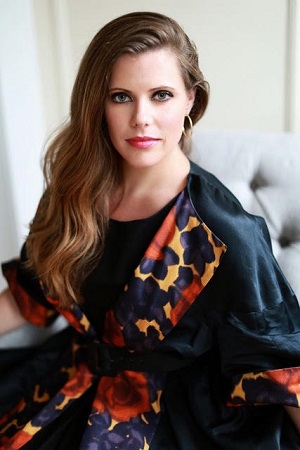 United States Britten: Kristina Bachrach (soprano), Andrew Fuchs (tenor), Michael Brofman (piano), Brooklyn Art Song Society, Old Stone House, Brooklyn, 7.12.2019. (RP)
United States Britten: Kristina Bachrach (soprano), Andrew Fuchs (tenor), Michael Brofman (piano), Brooklyn Art Song Society, Old Stone House, Brooklyn, 7.12.2019. (RP)

Britten – Folksong Arrangements Volume I – The British Isles: ‘The salley gardens’, ‘O can ye sew cushions’, ‘The trees they grow so high’, ‘The ash grove’, ‘Oliver Cromwell’; Volume III – The British Isles: ‘O, waly, waly’, ‘Come you not from New Castle’; Volume IV – Moore’s Irish Melodies: ‘How sweet the answer’, ‘At the mid hour of night’, ‘The last rose of summer’, ‘O, the sight entrancing’; Volume V – The British Isles: ’Sally in our alley’
This Brooklyn Art Song Society concert might have been entitled ‘Britten in Brooklyn’. The composer and his life-companion, tenor Peter Pears, came to North America in April 1939 for a myriad of reasons, both professional and personal. Their pacifist leanings were chief among them as Nazi Germany edged Europe closer to the abyss. When hostilities commenced later that summer, the men were advised by the British embassy in Washington to remain in the US as artistic ambassadors for the UK. They returned home in 1942 and were eventually granted full exemption from military service as conscientious objectors.
For most of their time in the US, Britten and Pears lived in Brooklyn Heights, just a few minutes by subway from the Old Stone House in Park Slope where BASS presented this short concert of twelve of the composer’s folksong settings. The current building is a reconstruction of a farmhouse built by a Dutch colonial family in 1699 in what was then the Gowanus section of the town of Breukelen. In August 1776, the Battle of Brooklyn, the first military engagement between the Continental Army and British forces after the signing of the Declaration of Independence, culminated at the Old Stone House. It was the largest battle of the Revolutionary War and a defeat for the Americans.
In 1941, Britten arranged a set of seven British folk songs for voice and piano. Not only was he homesick, but the Blitz, the Nazis’ mass air attacks on British industrial targets, towns and cities, stirred patriotic feelings in him. These sentiments are reflected in the bittersweet overtones of both the tunes he selected and his arrangements of them. Intended for Pears, the songs proved to be popular, and over the span of his career Britten published a total of seven sets of folksong arrangements from the British Isles and France. Others were published posthumously.
The singers in this concert were soprano Kristina Bachrach and tenor Andrew Fuchs, who have quite different vocal endowments but are equally gifted songsters. Bachrach’s soprano is rich and plummy, while Fuchs’ voice is a more slender instrument: he the clear-voiced troubadour with unsurpassable diction, and she a winning balladeer with a smile in her voice and a twinkle in her eyes, whether singing of love true or false.

The most captivating aspect of Bachrach’s singing was her phrasing, evident from the start in her first song, ‘Come you not from New Castle’, in which the musical lines melted into one another as she sang joyously of love. In ‘The ash grove’, Bachrach’s voice was tinged with melancholy as she told of a sweet maiden who sleeps beneath the green turf in the grove of trees, but unrequited love was wrapped in warmth and even a touch of humor in ‘O, waly, waly’. The most beautiful moments of the evening were Bachrach’s shimmering high notes that graced ‘The last rose of summer’.
Fuchs opened the concert with the rueful sentiments of an impetuous lad unlucky in love in ‘The salley gardens’. His voice easily expanded to fill out the well-known melody, as it did later in his haunting rendition of ‘At the mid hour of night’, but his command of text, cheekiness and ramrod straight posture set him apart as a topnotch musical storyteller. His ‘Oliver Cromwell’, with its ‘hee-haws’ and ‘hippety hops’, was pure fun, while wry delivery and confident manliness combined to make ‘Sally in our alley’ a heartwarming tale of love triumphing over the taunts and teasing of his neighbors.
Brofman accompanied the singers with his usual finesse and mastery. In the simpler passages, such as those found in ‘The ash grove’ and ‘How sweet the answer’, his playing was clean, clear and direct, while in the more dramatic ones, particularly the final verse of ‘The last rose of summer’, it was forceful and impassioned. The final song on the program was ‘O, the sight entrancing’, in which he pounded out the rousing accompaniment to Britten’s paean to freedom, sung with puffed-up, patriotic fervor by Fuchs.
BASS is celebrating its tenth season of presenting fine young singers in concerts that traverse the entire repertoire of art song, including premieres of the music of now. This refreshing bouquet of Britten folksongs was part of its ‘Home’ series of concerts that explore the concept of national identity through music; future recitals will feature the music of Scandinavian and Eastern European composers. BASS has not only made Brooklyn its home over the past decade, but also one of the most exciting venues for song anywhere.
Rick Perdian
For information on the Brooklyn Art Song Society’s upcoming concerts, click here.